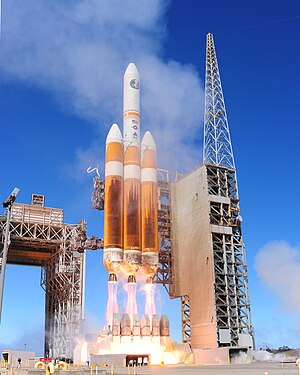
A hydrogen vehicle is a vehicle that uses hydrogen to move. Hydrogen vehicles include some road vehicles, rail vehicles, space rockets, forklifts, ships and aircraft. Motive power is generated by converting the chemical energy of hydrogen to mechanical energy, either by reacting hydrogen with oxygen in a fuel cell to power electric motors or, less commonly, by hydrogen internal combustion.[1]
Hydrogen burns cleaner than fuels such as gasoline or methane but is more difficult to store and transport because of the small size of the molecule. As of the 2020s hydrogen light duty vehicles, including passenger cars, have been sold in small numbers due to competition with battery electric vehicles.[2][3] As of 2021[update], there were two models of hydrogen cars publicly available in select markets: the Toyota Mirai (2014–), the first commercially produced dedicated fuel cell electric vehicle (FCEV),[4][5][6] and the Hyundai Nexo (2018–). The Honda CR-V e:FCEV became available, for lease only, in very limited quantities in 2024.[7]
As of 2019, 98% of hydrogen is produced by steam methane reforming, which emits carbon dioxide.[8] It can be produced by electrolysis of water, or by thermochemical or pyrolytic means using renewable feedstocks, but the processes are currently expensive.[9] Various technologies are being developed that aim to deliver costs low enough, and quantities great enough, to compete with hydrogen production using natural gas.[10]
Vehicles running on hydrogen technology benefit from a long range on a single refuelling, but are subject to several drawbacks including high carbon emissions when hydrogen is produced from natural gas, capital cost burden, high energy inputs in production and transportation, low energy content per unit volume at ambient conditions, production and compression of hydrogen, the investment required to build refuelling infrastructure around the world to dispense hydrogen.[11][12][13] In addition, leaked hydrogen is an invisible, highly flammable gas and has a global warming effect 11.6 times stronger than CO₂.[14]
- ^ "A portfolio of power-trains for Europe: a fact-based analysis" (PDF). iphe.net. Archived (PDF) from the original on 15 October 2017. Retrieved 15 April 2018.
- ^ Cite error: The named reference
rolewas invoked but never defined (see the help page). - ^ Poor, William (2024-08-20). "What happened to the "hydrogen highway"?". The Verge. Retrieved 2024-08-21.
- ^ Cite error: The named reference
wsj141215was invoked but never defined (see the help page). - ^ Cite error: The named reference
jt150123was invoked but never defined (see the help page). - ^ Cite error: The named reference
inf220516was invoked but never defined (see the help page). - ^ Voelcker, John. "Hydrogen Fuel-Cell Vehicles: Everything You Need to Know", Car and Driver, April 29, 2024
- ^ Cite error: The named reference
Realisingwas invoked but never defined (see the help page). - ^ Romm, Joseph. Tesla Trumps Toyota: Why Hydrogen Cars Can’t Compete With Pure Electric Cars" Archived 2014-08-21 at the Wayback Machine, ThinkProgress, August 5, 2014.
- ^ "Wind-to-Hydrogen Project". Hydrogen and Fuel Cells Research. Golden, CO: National Renewable Energy Laboratory, U.S. Department of Energy. September 2009. Archived from the original on 26 August 2009. Retrieved 7 January 2010.. See also Energy Department Launches Public-Private Partnership to Deploy Hydrogen Infrastructure Archived 2014-06-07 at the Wayback Machine, US Dept. of Energy, accessed November 15, 2014
- ^ Berman, Bradley (2013-11-22). "Fuel Cells at Center Stage". The New York Times. Archived from the original on 2014-11-07. Retrieved 2013-11-26.
- ^ Davies, Alex (2013-11-22). "Honda Is Working On Hydrogen Technology That Will Generate Power Inside Your Car". The Business Insider. Archived from the original on 2013-11-25. Retrieved 2013-11-26.
- ^ Cox, Julian. "Time To Come Clean About Hydrogen Fuel Cell Vehicles" Archived July 15, 2014, at the Wayback Machine, CleanTechnica.com, June 4, 2014
- ^ Bjørnæs, Christian. "Global warming potential of hydrogen estimated", Centre for International Climate and Environmental Research, June 7, 2023. Retrieved June 15, 2023